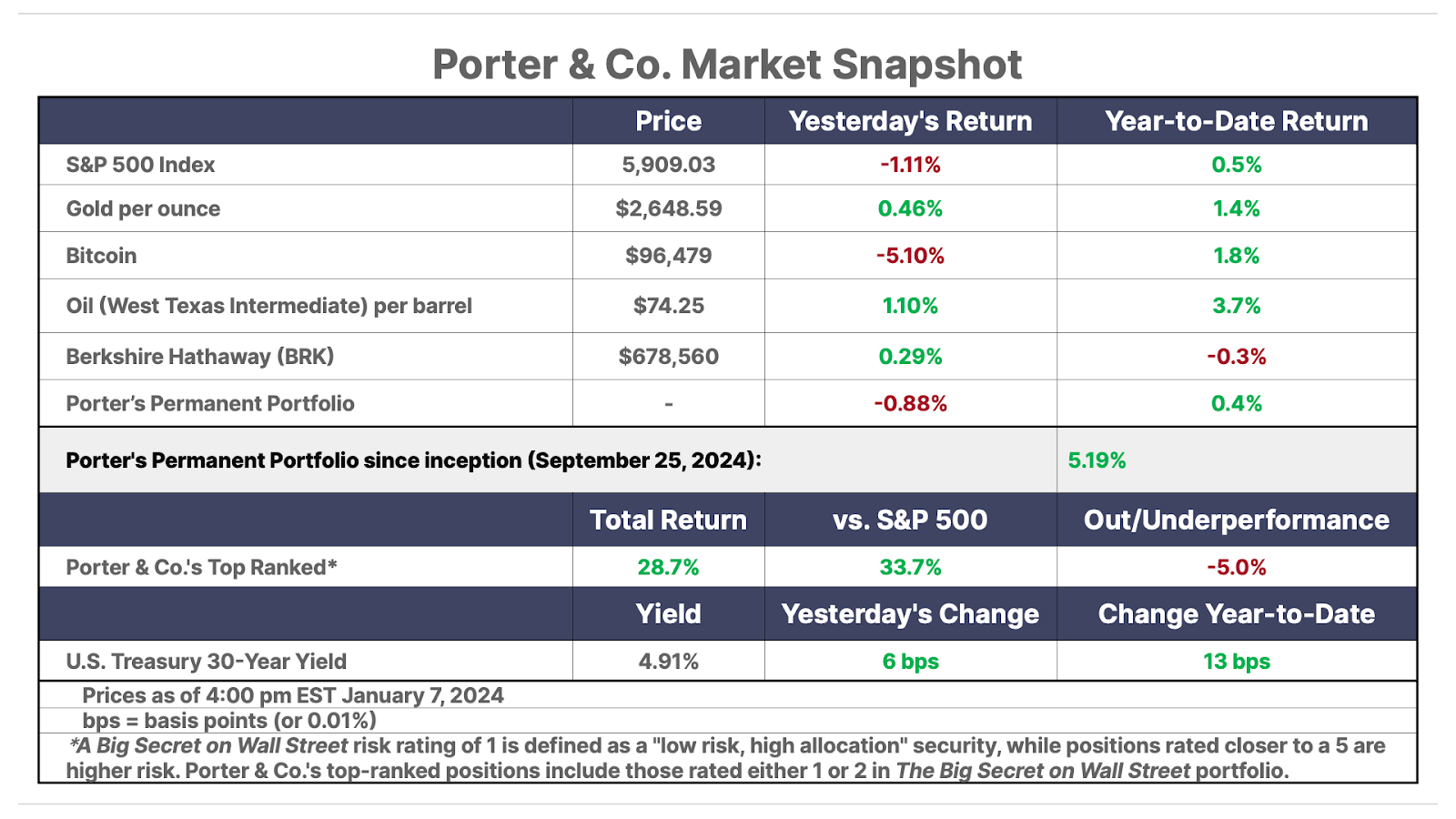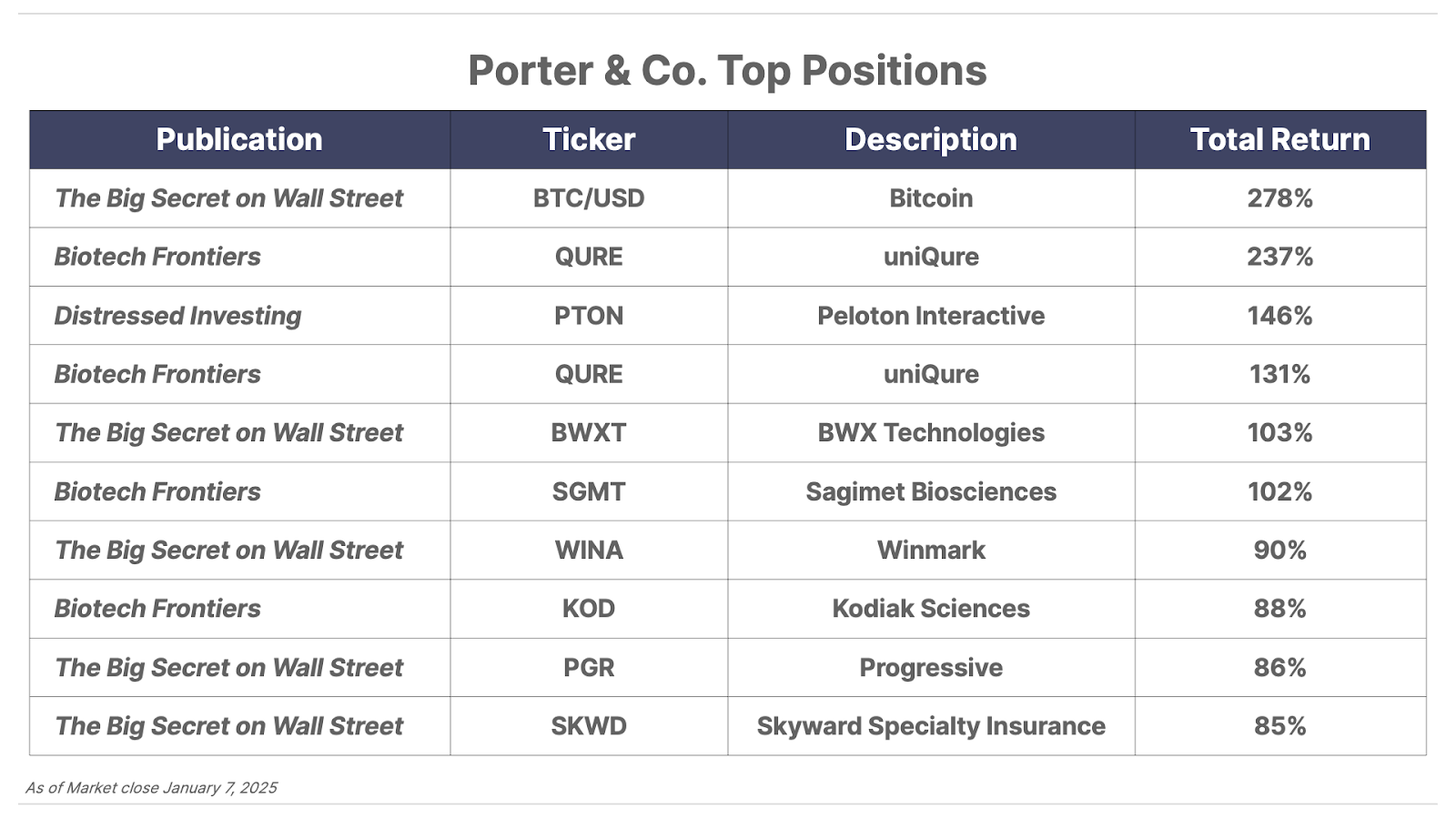Issue #2, Volume #2


Don’t Embrace The Bubble
This is Porter & Co.’s free e-letter, the Daily Journal. Paid-up members can access their subscriber materials, including our latest recommendations and our “3 Best Buys” for our different portfolios, by going here.
Three Things You Need To Know Now:
1. AI underperformance makes Apple shares vulnerable. The new artificial-intelligence (“AI”) features released in the latest iPhone models have been plagued by setbacks (including a text summarization feature that translated one woman’s message of “hike almost killed me!” to “attempted suicide, but recovered”). Apple shares are at a record-high valuation in part because of escalating expectations of an AI-powered “supercycle” in new iPhone demand. As we said in July, Apple will need to up its AI game – soon – to prevent some serious disappointment, to the detriment of the share price.
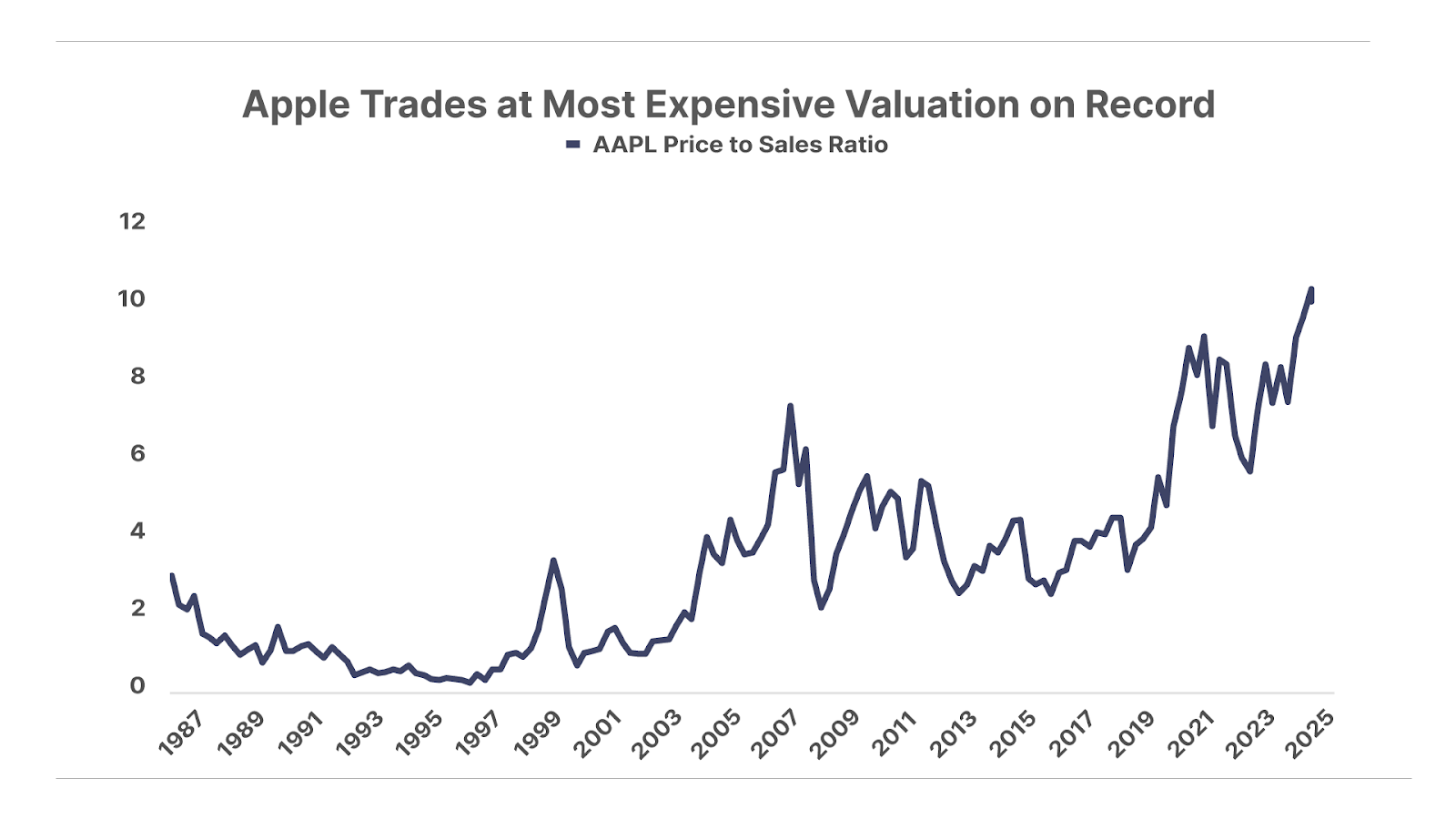
2. Is this time different? It’s not a secret that elevated market valuations consistently lead to lower returns – just as lower valuations often are the foundation for a period of higher returns. The S&P 500’s forward price-to-earnings ratio, at 22x, is at the top end of its range, following two exceptional years of 20%+ returns – only the fifth instance ever of two straight years of 20%+ returns. Three of the previous four times this happened were followed by declines in S&P 500 over the subsequent two-year period. Historically, at today’s valuation levels, subsequent 10-year S&P 500 returns ranged between -2% and 2% per year. There’s no reason to think that this time will be any different.
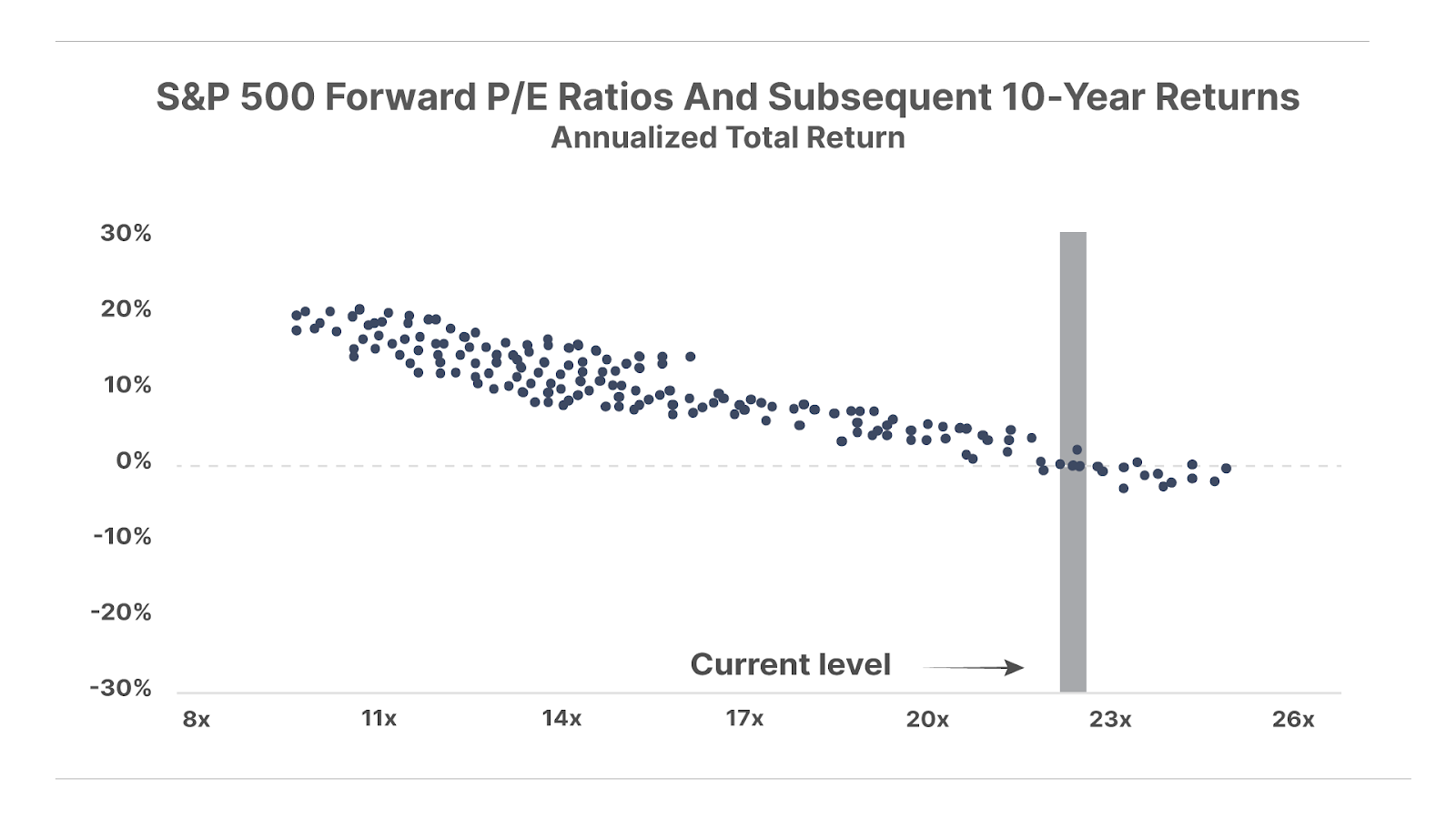
3. A mixed bag from the labor market. Yesterday, the U.S. Bureau of Labor Statistics’ Job Openings and Labor Turnover Survey (“JOLTS”) showed job openings in November increased for the second straight month – rising by 257,000 versus Wall Street expectations of a 189,000 decline. On the other hand, data released this morning by payment processor ADP showed private-sector hiring slowed more than expected last month. Still, barring a more severe slowdown in the government’s official December jobs report due Friday, this week’s labor market data is unlikely to persuade the Federal Reserve to consider additional interest rate cuts this year.
And one more thing…
President-elect Donald Trump during a press conference yesterday reiterated that the acquisition – perhaps by force – by the U.S. of Greenland and the Panama Canal is on the table. Analysts at brokerage houses on Wall Street and elsewhere are likely at this moment furiously compiling voluminous reports about the best way for stock investors to position themselves for the possible dramatic expansion of territory under American control. But we have half a dozen far better – and more immediately actionable – ways for investors to benefit from the Trump administration. It’s unlikely you’ve ever heard of these shares before… yet. Learn more in a special presentation that Porter has put together here.
Don’t Be Crazy
Don’t Embrace The Bubble
In its recent year-end forecast issue, Barron’s predicted yet another 20%+ rise in the S&P 500 for 2025.
“Investors Should Embrace the Bubble,” it said.
Einstein told us “the definition of insanity is doing the same thing over and over again and expecting a different result.”
It is well-proven that buying stocks at expensive multiples of earnings leads to future returns that are well-below average.
By the end of last year, across a wide spectrum of valuation measures, the S&P 500 was trading at valuation levels that were the highest on record, above even the valuations seen at the market’s most notorious peaks in 1929 and 2000.
These valuation levels imply very low returns in stocks (or even negative returns), on average, over the next decade.
Believing future returns won’t be well below average, or even negative, for the next decade is, by Einstein’s definition, insane.
Barron’s says “it’s different this time” because technology stocks make up a larger portion of the S&P 500 than in the past. The magazine also says corporate profit margins have been permanently increased thanks, once again, to technology.
But technology doesn’t change the fundamentally competitive nature of markets or provide any lasting shelter to competition. There are no facts behind Barron’s convenient tech-based explanations: virtually all the expansion of corporate profit margins since 1990 is explained by falling interest expenses, a trend that now seems likely to reverse because of rising inflation.
This bubble, like all the others, is a credit-based mirage that’s doomed to fail as inflation increases, interest rates rise, and credit defaults grow.
Financial bubbles occur as credit expands well beyond savings, warping the markets and creating the impression of endless prosperity.
Whose debt has fueled the huge expansion in credit this time? The outgoing administration has added $8 trillion in new federal debt. That’s about 25% of the entire U.S. national debt, in just four years. The resulting euphoria led investors to pay far too much for financial assets. Rising stock prices drew in more and more investors. Americans now have more capital allocated to the stock market than ever before. And thus, stocks are now trading at record-high valuations.
It is a bubble.
Likewise, another classic sign of a bubble is huge expansion to margin debt. While margin debt issued by brokers has declined recently, those declines have been more than replaced by the growth of leveraged ETFs. The SEC facilitated growth in these funds with a new rule (Rule 18-f) that took effect in 2019.
When you measure all outstanding margin debt, including leveraged ETFs, you’ll discover that it has actually increased by more than $1 trillion in the last two years.
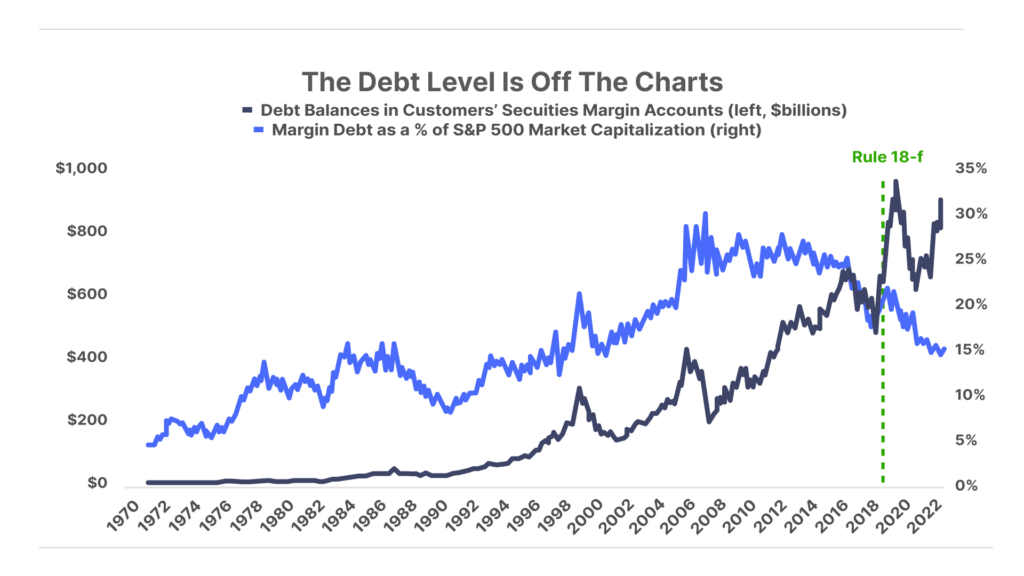
Investors (and Barron’s) are saying that “this time is different.” But, as the massive credit expansion creates rising inflation and, eventually, rising credit defaults, these illusions will be destroyed. Stocks, on average, will produce very poor returns over the next decade – or until valuations recede substantially.
Our advice? Don’t be crazy. Don’t embrace the bubble.
Let me know what you think by sending comments to [email protected]
Good investing,
Porter Stansberry
Stevenson, MD
Mailbag
Today’s letter comes from J.E., who writes:
It’s very interesting how Porter can continue to say this newsletter is not political, while he continues to bash all Democrats and their philosophies. I enjoy Porter’s financial advice but wish he could keep his MAGA sympathies from the publication. There is nothing worse than a “poor winner.”
P.S. It’s very interesting that market yields are practically identical under both Democratic and Republican presidents.
Porter’s comment: Everyone thinks I’m a Republican when the Dems are in power. And everyone thinks I’m a Dem when the Republicans are in power. I’m neither. I don’t object to your particular political ideology: I object to being subject to any of them. Our government has no legitimate right to my person or my property because it is openly in violation of the U.S. Constitution. America was founded on this idea, that liberty is given by God and, therefore, the consent of the governed is required for peace and prosperity. Before surrendering their hard-fought liberty to a new government, our forefathers agreed to a whole series of safeguards to prevent the emergence of tyranny in America. There were many such safeguards, but first among them was our right to free speech, our right to bear arms, and our right to a sound economy based on real money – not fiat. Other critical provisions included specifically forbidding income tax and, later, requiring that the law treat every citizen equally. It’s pathetic that most Americans don’t understand that these guarantees are required to prevent the government from doing exactly what it has done: become the overwhelmingly dominant institution in our country. There’s absolutely no reason that in America, the “land of the free,” we have a government that spends roughly 40% of GDP and completely controls another 20% of the economy by its de-facto control of mortgages and the entire health care system. THIS SHOULD HAVE NEVER, EVER HAPPENED IN AMERICA.
How did it? Three critical things permitted the creation of our leviathan government. First, the tyranny of paper money. Congress is only granted the power to “mint coin,” and to regulate the value of those coins. The later 1792 coinage act makes devaluing the metallic value of our coins a criminal offense punishable by the death penalty. There is no authorization, anywhere in the Constitution, for the government to produce or mandate fiat currency. And, in fact, in Article I, Section 10, the Constitution explicitly says states may not make anything other than gold or silver legal tender: “no state… shall make any Thing but gold and silver Coin a Tender in Payment of Debts.”
Second, the original Constitution specifically forbade income taxes. In 1913 – the same year the government set up the Federal Reserve – the Constitution was amended to allow for a tiny income tax that would only be applied to the “rich.” It was less than a decade before we were in a world war and income taxes were set at 70%. (See why our founders explicitly forbade income tax?) Whether income taxes are legal now or not, the 14th Amendment calls for the “equal protection” of the laws, which means, in plain English, that citizens must be treated equally. Well, when my marginal income tax rate is 54% and most Americans pay nothing – at all – in income taxes, I’d suggest that the entire system is completely illegal.
And third, the Constitution is explicit that the government isn’t allowed to conduct searches without probable cause that a crime has been committed. “The right of the people to be secure in their persons, houses, papers, and effects, against unreasonable searches and seizures, shall not be violated, and no Warrants shall issue, but upon probable cause.” And yet we know, for certain, that the government routinely spies on all of our communications, 24/7. It requires banks to report all of our deposits and spending. And uses this power to censor free speech, to target its political enemies, and to engage in corporate favoritism without even notifying citizens of their actions.
Our government is the single biggest threat to liberty, peace, and prosperity in the world today. And anyone who aids it is complicit in its crimes. My hope is that President Donald Trump will begin the long process of curtailing these massive violations of our rights.
But ain’t holding my breath.
